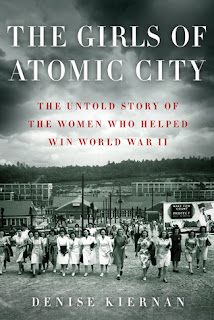For my most recent book club meeting, I got to delve into some nonfiction for the first time in a while! The book was Atomic City: The Untold Story of the Women Who Helped Win World War II by Denise Kiernan. This one has some local appeal; Oak Ridge, located just north of Knoxville, is a familiar locale to Tennesseans and, in the decades since WWII, has earned some tourist notoriety for its one-time secret status. Plus, the book group I joined skews older, so many of our readers had personal memories attached to this story, as well.
Imagine this scenario: You're living in 1943 in a nation embroiled in war, which permeates every piece of daily life. You've just finished high school or college, and with your brothers overseas fighting for your country, you have few options but to stay close to home and get a job. Then, you get this job offer with a description that could not be more vague. It seems too good to be true—the pay is outstanding and it's supposed to help win the war. Once you've secured the job, you follow the mysterious instructions you were given to take a specific train to a location you've never heard of. And once you arrive to this strange community called Oak Ridge, you settle into a new life, making new friends and doing your best every day at the job you were given. You're not really sure what's going on at Oak Ridge, but it's run by the military and therefore secretive and therefore must be helping the war cause.
This was the reality for the many women Kiernan profiles in this book. The story of Oak Ridge is a fascinating—and multi-faceted—one. This complex created by the US military, originally designed to house 17,000 workers, ultimately became home to over 62,000 individuals. These people all came to Oak Ridge for a job. From them grew friendships, relationships, a town, a community. These people became experts at their job, whatever they were, but only a fraction of 1% of Oak Ridge's residents actually knew their ultimate purpose. It was masked in secrecy, and there were constant reminders that "loose lips sink ships."
It wouldn't be until August 6, 1945, that they would figure out they had spent the last two years building the world's first deployed atomic bomb.
Perhaps now you understand why I said this story is a "multi-faceted" one. Kiernan opted to tell a particular piece of the Oak Ridge story, to view it from one perspective—that of the women whose lives were changed by this incredible reality. In this, I think Kiernan did an excellent job. She uses a handful of women to recollect the Oak Ridge experience; the reader gets to know these women as individuals—their backstories, their motivations, their fears. Through them, we understand how thousands of people united behind a common cause, despite their knowing little about it in the first place!
This is where it gets tricky for me. Naturally, my 2016 perspective is vastly different than the 1943 one of these women. And when viewed through the modern lens to which I am accustomed, this story of Oak Ridge is terrifying!
Kiernan tells this nice, patriotic, feminist story of women doing important work, but can you imagine if we heard this story in present-day terms from some country across the globe?? "Thousands Build Nuclear Weapon in Secrecy!" "Community Brain-Washed Into Building Atomic Bomb!" I understand that times were different. The war was so all-encompassing that "helping to win the war" was justifiable enough reasoning; there was little to question. Further, the mentality was different than it is today—less thirst and desire for constant information, less skepticism, fewer questions. Plus, the mere existence of these opportunities for the women of 1943, when their norms and expectations were so vastly different than today, probably fostered more excitement than suspicion.
And we haven't even touched on the debate surrounding the moral implications of dropping the atomic bomb. That's a whole other part of the story!
For what it is, I think Kiernan's book is an excellent piece of story-telling. She humanizes a piece of history while using plenty of research to create context for the reader. And she is not (and should not be) obligated to, nor responsible for, telling the whole story of Oak Ridge. But having never deeply encountered this particular piece of history myself, it opened up a can of worms
Extra: It's worth noting that our book club discussion was a pretty engaging one. Reactions and opinions seemed to run the gamut. Some women felt the same as me and had many more questions about this whole scenario; others just accepted it for what it was without much questioning. I think it's so interesting, and fosters such great discussion, because the themes go beyond this one historical scenario; it brings into question bigger ideas such as trust and fear, patriotism, society and individualism. A great one for discussion!


No comments:
Post a Comment